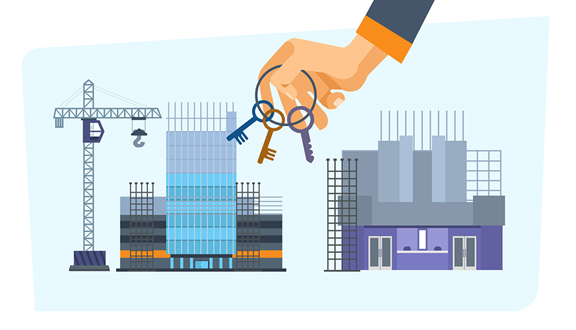How To Get A Commercial Loan To Develop Your Property In San Antonio
Expanding to a new location, buying or renovating commercial real estate in San Antonio is an exciting move but at the same time challenging as much money are at stake. If you’re a property developer, landlord, or investor, there are different finance available to help you kick-start your next project.
You’ll need commercial real estate loans to finance the work. These loans offer manageable monthly payments, lower interest rates, and longer repayment terms than many other kinds of business loans. However, there are so many options of real estate loans available, and finding the right one can make a big difference to the completion of your project. In this post, we’ll run through things that will help you make the right property development finance choices.
How Do Commercial Real Estate Loans Work in San Antonio?
Commercial real estate loans can help you pay for the high cost of developing your new business property. Technically Commercial real estate loans such as commercial mortgage loans or Commercial Bridge Loans are secured by liens on the property you’re purchasing. In this case, the property serves as a guarantee for the repayment of the loans. Before funding your commercial real estate loan, most lenders in San Antonio will typically require a down payment between 20 – 30 percent of the property purchase price.
Commercial Real Estate Loan: Fees, Interest Rates And Repayment Terms
Many people believe commercial real estate loans are related to residential mortgages, but that’s not true. There are many types of commercial property loans, each a little bit different in fee, eligibility, repayment terms, interest rate, and other factors, which we’ll discuss below.
Fees
Commercial real estate loans come with different fees such as property appraisal cost, loan application, legal costs, loan origination, and survey fees. Some lenders will want borrowers to pay these fees before the loan is approved while others apply the overall cost annually.
However, you need to know the fees associated with the commercial real estate loan before committing to the loan. You should also be aware of any prepayment penalties, and there could be an interest guarantee, or lockout restricting for you paying off the loan early. Ask your lender to clearly explain all fees that will be part of your total cost of borrowing.
Interest Rates
The interest rate you get on your real estate loan depends on your type of property, your creditworthiness, and financial health. Commercial real estate loans always come with a low-interest rate depending on the kind of real estate lender you work with. Your loan-to-value (LTV) ratio will also determine your interest rate.
LTV ratio measures the value of your loan against the value of the property purchased. Let’s assume you plan to buy a $200,000 worth of property. The lender requires you to put down payment of about 20 – 30% while they cover 70 – 80%. The higher your down payment and the more skin you have in the game, the lower your interest rate will be.
Repayment Term
Commercial real estate loan repayment terms depend on which lender you opt for and the type of loan. These loans come in two types of terms: Amortized loan or balloon loan. An amortized loan allows you to repaid in fixed monthly installments until you’ve entirely paid the lender back, plus interest. That means you make payments in monthly installments.
On the other hand, a balloon loan requires you to make a one-time big repayment at the end of the loan terms to pay off your principal. When you get a balloon loan, you’re given a duration typically up to 7 years. You’ll also have fixed monthly payments. If you’re considering a balloon loan, your cash flow should be ready for it because the last payment will be very high.
Applying For The Loan

Applying for commercial real estate loan to develop your property requires all the relevant documents for the project. When lenders assess your development project, they look carefully at the quality of the security you are offering. The information that you need to supply in your application includes:
- Asset and liability statement
- The type of development
- Schedule of works and build stages
- Cost of the land and construction
- Design concept
- The financial strength of the developer
- The development experience or track record
- Full details of the professional team involved
- Timelines until completion
- Projected sales figures with the profit margin
- Other costs and many more.
Mistakes To Avoid
The commercial real estate sector can be rewarding, but as with any investment, it so comes with significant risks. Wading into real estate development without the understanding of the mistakes to avoid has caught many first-time developers’ dreams short. One of the most apparent mistakes is not completing a thorough feasibility analysis of the cost involve especially tax liabilities or holding costs. Another mistake is trying to make your application for property development loan attractive to lenders, so you have a better chance of getting property development finance.
However, developing your real estate property can be an excellent way to create wealth, but you need to understand what you’re doing. You need to understand what the market conditions will be when you complete the project, as well as have realistic expectations of the profit margin you’re likely to achieve. Doing this will reduce your risk, help you avoid common mistakes and makes you a successful real estate developer.
How To Find The Right Loan
All successful real estate developers are good planners, and getting the right finance in place is a crucial ingredient in your success — whether you’re renovating your building, or growing your portfolio. There are plenty of commercial loans out there for everyone from commercial mortgage loans, commercial bridge Loans to hard money loans and many more, so it’s important to shop around to find the best one for your situation.
Cloptoncapital recommends developing a comprehensive plan for what you plan to do before you do anything. Doing this will help determine what type of loan is best for you and how long you want the repayment term to be. However, make sure you choose a loan that will help you achieve your ultimate goal and fits within your budget as you consider different options.







